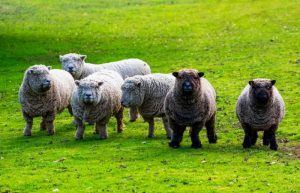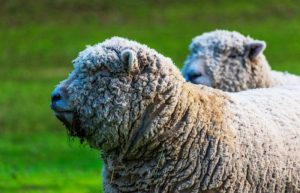
Babydoll Sheep Size & Weight Facts
Babydoll sheep are considered small wool sheep that are popular not only as pets but also as livestock to raise for a profit. Miniature livestock can be a great choice for you if you are looking to conserve resources and cause less stress on your land. Babydoll sheep are great small livestock if you’re looking to harvest wool, run a breeding operation, butcher your own meat, or simply have a pet for your kids.
How big do babydoll sheep get? On average, babydoll sheep range from 18 – 24 inches (46 – 61 centimeters) in height at their withers and 70 – 120 lbs (32 – 54 kilograms) in weight. They are considerably smaller than other breeds of sheep and demand less land and resources when it comes to caring for them.
If you are considering purchasing some sheep, it’s always important to take into account the type of breed you’ll want. If you’re looking for friendly sheep that are low-maintenance and require fewer resources, babydoll sheep may be the breed for you. To learn more about how babydoll sheep differ from other breeds, keep reading!
How Do Babydoll Sheep Differ From Other Sheep?
You may be wondering how babydoll sheep compare to other sheep when it comes to their height, weight, longevity, and needs. To help you get a better idea, I’ve listed some facts down below that point out the differences and similarities between babydoll sheep and other breeds:
Babydoll Sheep
- 18 – 24 inches (46 – 61 centimeters) in height at their withers
- 70 – 120 lbs (32 – 54 kilograms) in weight
- a lifespan of 12 – 16 years
- usually, 1 acre of land can sustain 5 babydoll sheep
- will need to be shorn once a year
- 145-day gestation period
- Babydoll wool is more similar to cashmere than it is to normal wool fleece
- Are less prone to common sheep diseases and parasites
- The most common color patterns of babydoll sheep are black and white
- Cost between $200 – $500 (if registered)
Other Sheep
- average height of 36 inches (91 centimeters) at the withers
- weighs anywhere from 100 – 300 lbs (45 – 136 kilograms
- lifespan of 10 – 12 years
- 1 acre of land can usually support two sheep
- Wool sheep are often shorn once a year
- Hair sheep do not require shearing
- 145-day gestation period
- Can range in color from white, black, spotted, and freckled
- Cost anywhere from $75 – $250
As you can see, the most noticeable difference between babydoll sheep and other sheep breeds is their size. They are considerably smaller than other sheep; therefore, they can be sustained on less land and resources.
What to Know About Raising Babydoll Sheep
Hopefully, by now you’ve started to consider adding babydoll sheep to your barnyard. Before you go out and buy a few of these adorably cuddly critters, keep reading to learn more about taking care of babydoll sheep.
Babydoll Sheep Will Need Protection From Predators
Due to their small size, it’s a given that babydoll sheep should have some kind of protection from predators. The biggest threat these small sheep face are dogs, coyotes, and wild cats. A smart move would be to invest in a livestock guardian animal for your sheep. Donkeys and dogs are the best guardian animals for babydoll sheep, as they will chase predators preying on the flock. To learn more about livestock guardian animals, check out my article What Are the Best Livestock Guardian Animals.
I’ve heard that many babydoll sheep farmers will actually shut their sheep in a corral or a barn at night to help keep them safer from the predators that like to hunt under the guise of darkness. As smaller animals, they have a bigger target on their backs. It’s important to take the necessary steps to protect your babydoll sheep and understand that they are more likely to be hunted compared to other livestock animals.
Make Sure Your Babydoll Sheep Have Secure Fencing
 Babydoll sheep are small and usually passive animals. While other livestock like cows and goats may test their fencing every now and then, babydoll sheep usually won’t. They are content to stay in their pasture close to their flock.
Babydoll sheep are small and usually passive animals. While other livestock like cows and goats may test their fencing every now and then, babydoll sheep usually won’t. They are content to stay in their pasture close to their flock.
Because of their passive nature and small size, some may be tempted to use less sturdy fencing or hog panels, which a human could easily step over. Although your sheep may not challenge the fencing, it’s important to note that predators certainly will. Coyotes can easily hop over hog panels to attack your sheep.
For this reason, the best type of fencing to use for your babydoll sheep is a welded wire fencing that is at least 4′ high. The welded wire will keep predators from slipping through the fence while the height can keep certain predators from jumping over. Another thing to consider is burying your fence into the ground to keep predators from digging or being able to slip under the fence.
You Can Diversify With Babydoll Sheep
If you’re looking to generate some revenue with your livestock, babydoll sheep can be a great avenue to take. These sheep can have many different uses and are often in high demand. Here are some ways you can profit from babydoll sheep:
Wool Harvesting
Babydoll sheep are wool sheep, meaning that they grow a soft wool fleece each year that will need to be shorn during the spring. Babydoll fleece is exceptionally soft and fine, relating more to cashmere than to normal wool. Babydoll sheep fleece can be worn close to the skin without causing irritation as other wool can cause.
Breeding Operation
Babydoll sheep will usually produce two lambs at a time, which can be looked at as a greater return on investment. You can sell registered babydoll sheep for a higher price than you would normal sheep due to their ancient pedigree and many positive qualities. Babydoll sheep are also very low-maintenance, which means they can usually be bred and give birth without the difficulties that other sheep breeds may have.
Meat
While I haven’t personally eaten babydoll sheep meat, it’s said to be one of the most tender meats in the world. Mutton may be considered more of a delicacy in the USA, but there is still a market for it. You may find that it’s easier to get into a local market, selling to restaurants and local grocery stores rather than trying to find a big commercial vendor.
Family Pets
You will have no trouble raising babydoll sheep to be family pets. families will rush to add these cuties to their backyard or barnyard, as babydoll sheep are usually very friendly and sweet. However, it’s important to note that the people who want the sheep may not know anything that goes into caring for them. I recommend having some type of application process when it comes to selling your babydoll sheep as family pets to ensure they are going to good homes where they will be taken care of properly.
Need Your Yard Maintained? Get Babydoll Sheep
Do you hate doing yard work? If so, then a flock of babydoll sheep may be the right choice for you! Many times, people will use babydoll sheep to maintain yards, orchards, and vineyards. The sheep will eat weeds and trim overgrown plants without de-barking trees and decimating anything in their path like goats would. You can put them out in your yard to keep the grass trimmed and eat away any weeds that may be rearing their ugly heads.
Babydoll sheep won’t eat fruit, grapes, or berries that they find on branches or vines, so they are a great choice for keeping up an orchard. Their poop also acts as a fertilizer to the soil, filling the dirt with healthy nutrients that can feed your plants.
Sheep are grazers, so they do need some forage that can sustain them, like grass or hay. Goats, on the other hand, are browsers and will usually eat anything they find. While sheep may not be able to thrive in a wooded setting, goats sure can. To learn more, check out my article Can Goats Live in the Woods?
Babydoll Sheep Are Healthier Than Other Sheep
Babydoll sheep is an ancient breed officially known as Babydoll Southdown sheep. They originated in England, but have now become popular all over the world. Due to the age of the breed, they are less prone to some of the diseases, ailments, and parasites that commonly plague other sheep breeds.
These small sheep are more resistant to intestinal parasites and bacterial infections, but just because they’re hardy doesn’t mean you should ignore them and forego routine care and maintenance. Babydoll should still get dewormed regularly, have their hooves trimmed, and get the necessary vaccines for your area. They can also contract external parasites like fleas and ticks. You can care for a sheep with fleas much as you would a goat with fleas. To learn more, check out my article Do Goats Get Fleas? Essential Goat Care.
Overall, babydoll sheep are great if you’re looking for small low-maintenance livestock. They can also make great pets! However, if you want a babydoll sheep as a pet, it’s important to know that sheep should not be kept by themselves. It’s a good rule of thumb to get at least five sheep to provide a flock setting. To learn more about how to properly keep sheep, read my article Can You Keep a Sheep By Itself? Essential Guide.
